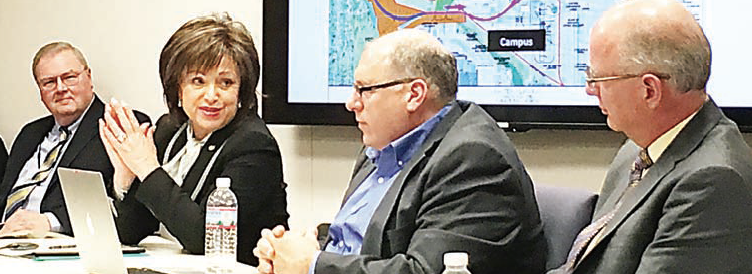WCC president to Senate panel: Community colleges play a crucial role in the state’s transportation future

Washtenaw Community College plays a crucial role in Michigan’s transportation future, WCC President Dr. Rose B. Bellanca told the Michigan Senate Committee on Economic Development and International Investment in March.
The focus of the committee meeting was to discuss the need to build an infrastructure to support autonomous and connected transportation in Southeast Michigan.
Held at the University of Michigan Mcity Test Facility, Dr. Bellanca joined a group of thought leaders including Carrie Morton, deputy director of the University of Michigan Mobility Transformation Center; Steve Arwood, CEO of the Michigan Economic Development Corporation, Kirk Steudle, director of the Michigan Department of Transportation; Paul Krutko, president and CEO of Ann Arbor SPARK, and John Maddox, CEO of the American Center for Mobility. Maddox also holds a partial appointment with the University of Michigan Mobility Transformation Center.
Dr. Bellanca’s remarks focused on the crucial role community colleges play in developing a skilled workforce that understands the requirements of jobs related to autonomous and connected transportation.
“We all see that cars, buses, trains and planes now operate as part of an intricate web of technology,” Dr. Bellanca told committee members.
“The future of Michigan’s automotive and transportation industries depends on cultivating a steady pipeline of talented, qualified, and highly skilled technicians and engineers to meet the workforce demands.”
She emphasized that the development of a skilled workforce needs to begin by focusing on STEM (science, technology, engineering and math) education, starting in K-12 and progressing to higher education at colleges and universities.
WCC has responded to the talent needs of the mobility industry with its Advanced Transportation Center. The center is focused on developing and growing the talent necessary to keep Michigan the global epicenter of the automotive industry and intelligent transportation systems.
“By offering a mix of expertise, programming, a strategic location and industry partnerships, WCC is leading the way for community colleges in the advanced transportation sector,” said Dr. Bellanca.
“We recognize how the emerging mobility sector forms the basis of one of Michigan’s most important economic development initiatives. Our Advanced Transportation Center will prepare WCC students to directly enter into a skilled trade area in the mobility industry, or for students in areas requiring an advanced degree, we have transfer options with four-year universities that will save them thousands of dollars.”
Bellanca concluded her remarks by expressing her appreciation for the opportunity to partner with the region’s business and automotive communities and to share the resources of the college throughout Southeast Michigan.
By Susan Ferraro, APR
Director of Media Relations
